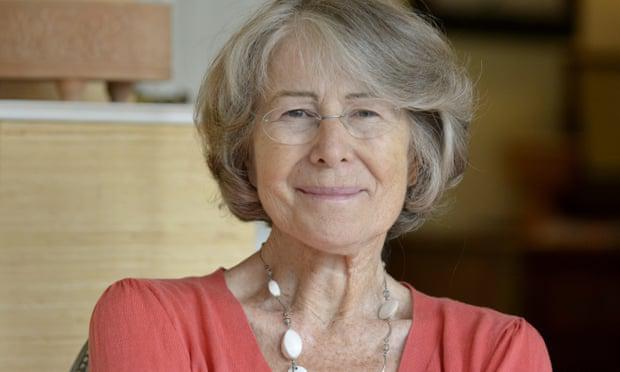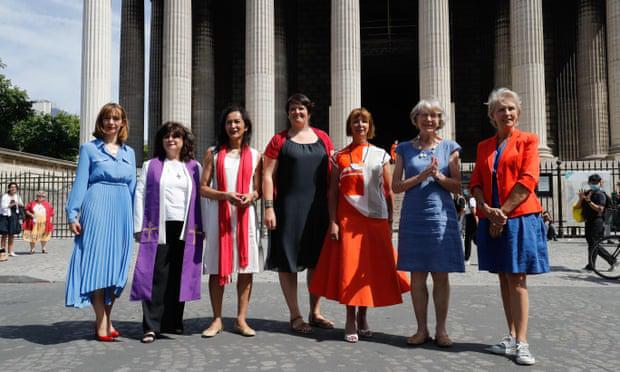|
‘Women are future of the Catholic church’: Anne Soupa leads renewed fight for equality
By Harriet Sherwood
French academic’s bid to become archbishop of Lyon reflects growing calls for women in leadership roles A French female academic has put herself forward to be the next Catholic archbishop of Lyon in a move that is gathering support around the world even though she stands no chance of succeeding. Anne Soupa, 73, a theologian and biblical scholar, says there is “an awakening of women within the Catholic church”. Seven other Catholic women in France have followed her move in applying for ministries that are open only to men. More than 17,000 people have signed a petition in support of Soupa’s attempt to succeed Cardinal Philippe Barbarin, who resigned this year after an appeal court overturned his conviction of covering up sexual abuse, The Roman Catholic church does not allow female priests, and Pope Francis has ruled out any change to the centuries-old rule. However, in April he created a commission to examine the issue of female deacons – a rank below priests – after an earlier panel failed to reach agreement. This month, he appointed six women to a body that oversees Vatican finances, a significant step in fulfilling a pledge to put more women in top jobs. But some say his actions barely begin to tackle gender discrimination in the church. In launching her campaign, Soupa said on Twitter: “To exclude half of humanity is not only contrary to the message of Jesus Christ, but is also harmful to the church, which is thus maintained in an environment that is conducive to abuse.” Laying out her credentials for the post, she added: “Everything entitles me to say that I am capable of running for the title of bishop, everything makes me legitimate. Everything forbids me to do so.” She asked: “Is there only one model of a bishop, that of a single, elderly man dressed in black?” This month the archbishop of Hamburg, Stefan Hesse, called for an open debate on the ordination of women in the Catholic church, saying: “One has to be permitted to think about and discuss the issues.” Advocates of women’s ordination say it could revitalise the church in regions where the shortage of priests is raising questions about its viability and in places where the crisis over sexual abuse has drained support for and involvement in the church. Soupa’s move has “triggered something in people – there is an outpouring of support”, said Miriam Duignan of Women’s Ordination Worldwide. “There is definitely a growing movement within the church over the role of women in leadership positions. “The Catholic faithful do not share the Vatican’s disdain for women, and are ready to see them fulfil their vocations to all ministries in the same way that male candidates can.” According to the Vatican, there were about 660,000 nuns globally in 2016, a fall of about 100,000 since a decade earlier. In February, Women Church World, the Vatican women’s magazine, attributed the drop in the number of religious sisters to wretched working conditions and sexual abuse and abuses of power by priests and their own superiors. There are millions more Catholic lay women in parishes around the world whose tireless and often unacknowledged work sustains the church. Tina Beattie, a professor of Catholic studies at the University of Roehampton in London, said: “There is a strong grassroots movement for change now, but it doesn’t always take the same form. Among women in western liberal democracies, campaigns for leadership and ordination are very strong. “In other areas, there is more emphasis on exposing and challenging clerical abuse of women – nuns in particular; domestic violence; abuses of power within the clergy.” In some places, she said, women regarded demands for women’s ordination as a distraction from campaigning for more radical change from the grassroots. They were building “movements and networks of solidarity and strength within the church, and not allowing themselves to be defeated by what comes out of Rome”. They had had enough of being “silenced, subordinated and excluded from decision-making”, and many were disappointed with Pope Francis on this issue, she added. “He could have been as brave and outspoken about women as he has been about so many other subjects.” In an interview on France24, Soupa said: “Why has the pope not done more on this issue? I believe Pope Francis’s efforts are being thwarted by currents within the church … strong and powerful reactionary currents.” She added: “Pope Francis has yet to walk the talk … The church cannot operate without women … [they] are the future of the church.” The French women who have applied for posts traditionally open only to men have formed an alliance, Toutes Apôtres!. Its manifesto says: “Long and painful have been the decades during which baptised Catholic women have politely asked for real equality within their church. They are not received; hardly listened to … And still we are being asked to be patient. “But today, faced with the urgency of our church’s situation, we have no choice but to tackle these obstacles.” The Vatican’s ambassador to France, Archbishop Celestino Migliore, has offered to meet some of the women in September.
|
.
Any original material on these pages is copyright © BishopAccountability.org 2004. Reproduce freely with attribution.

